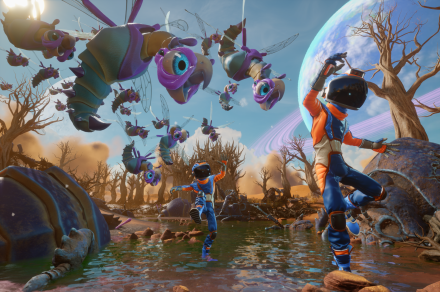Revenge of the Savage Planet: Hilarious Sci-Fi Meets Corporate Chaos!

A Fresh Look at Revenge of the Savage planet
Overview
Revenge of the Savage Planet is a game priced at $50. It offers a mix of humor and exploration in an open-world setting.
Key Features
Pros
- Sharp humor
- Fun exploration
- Smart environmental puzzles
- Cooperative gameplay enhances experience
Cons
- Story loses focus towards the end
- Predictable structure
- Combat lacks excitement
The Appeal of Video Games
In todayS competitive environment, it often seems like only the ruthless thrive. This mindset benefits the wealthy and powerful while leaving many struggling. video games can provide an escape from this harsh reality.Titles like Red Dead redemption 2 allow players to indulge in a fantasy were they control everything around them, from animals to resources.
Satirical Elements in Gameplay
Revenge of the Savage Planet takes this idea further by using satire to critique corporate greed and exploitation. Building on its predecessor, Journey to the Savage Planet, developer Raccoon Logic amplifies its commentary while shifting from homage to a more direct adventure style. Players take on roles that reflect their frustrations with powerlessness in real life.Despite some flaws, such as an unfocused story and repetitive action, revenge of the Savage Planet delivers enjoyable sci-fi fun filled with dark comedy.
A Familiar Setup
The game opens with a corporate video introducing players as new employees at Alta Interglobal after their previous company was acquired. Upon waking from cryosleep, players learn they've been fired during their slumber—a scenario that resonates with many real-life experiences involving corporate takeovers.
This setup mirrors recent events where companies have laid off staff post-acquisition, making it relatable for those familiar with industry changes. Raccoon Logic's own history adds depth; after being bought by Google for its Stadia project, they faced closure before releasing any games.
Corporate Critique
The narrative shines when it critiques corporate culture through side quests that expose Alta’s shady practices—likely nods toward Google's internal issues. However,as players approach the climax,they encounter meta-commentary about game design that feels disconnected from earlier themes.
While humorous moments abound—like absurd commercials—the overall tone aims for irreverence reminiscent of adult Swim shows rather than deep social critique.
Themes of Colonialism and Consumerism
At its core, Revenge of the Savage Planet serves as broad satire against colonialism and consumerism. Players explore various planets filled with resources ripe for exploitation while embodying a character trained to extract every last bit without remorse.
Each area presents opportunities for gathering materials or interacting with alien wildlife—frequently enough leading to humorous outcomes when creatures explode into colorful mist upon defeat or capture.
Gameplay Mechanics
The gameplay mechanics blend parody elements while maintaining traditional open-world features like resource collection and upgrades through crafting systems similar to titles like Subnautica but without survival aspects.
Players gather items needed for upgrades or decorations within their habitats while navigating challenges across diverse environments—from deserts teeming with worms to towering mountains filled with secrets waiting to be uncovered.
Raccoon Logic balances lightheartedness against darker themes effectively but could push boundaries further regarding player actions' consequences within these alien worlds.
Conclusion: A Playful Yet Thoughtful Experience
Ultimately, Revenge of the Savage Planet is an entertaining sequel that might benefit from bolder choices regarding its satirical edge. While exploring alien landscapes provides joy through clever puzzles and cooperative play options remain engaging throughout each session; combat feels lackluster compared against other genre entries.
Players may find themselves wishing Raccoon Logic would embrace more outrageous scenarios allowing them greater freedom over how they interact within these vibrant settings instead opting mostly towards lighthearted mischief rather than outright chaos.
In conclusion: perhaps we all share responsibility playing along within systems designed primarily for entertainment yet reflecting deeper societal issues worth examining closely—even if wrapped up inside whimsical adventures among distant stars!





